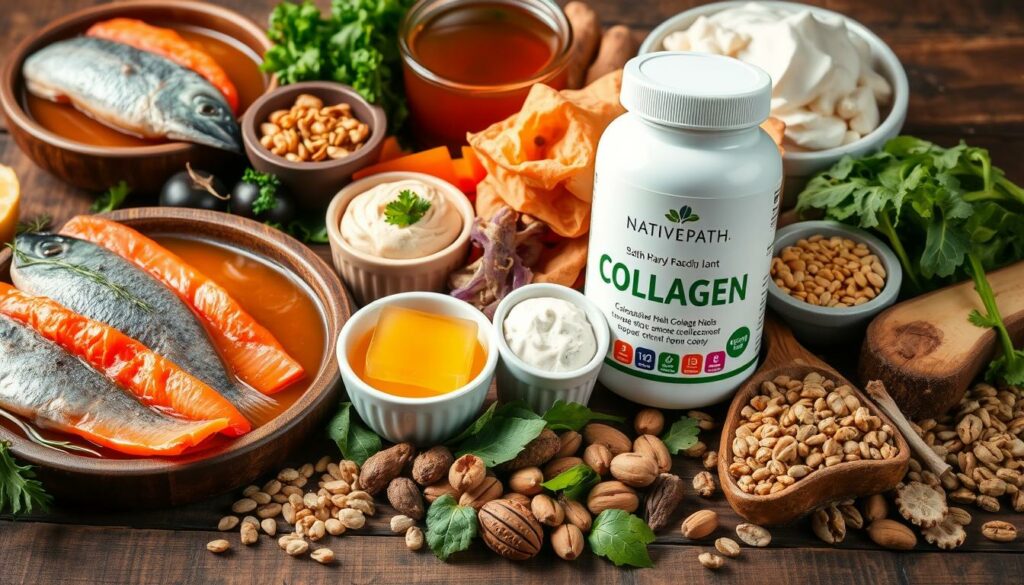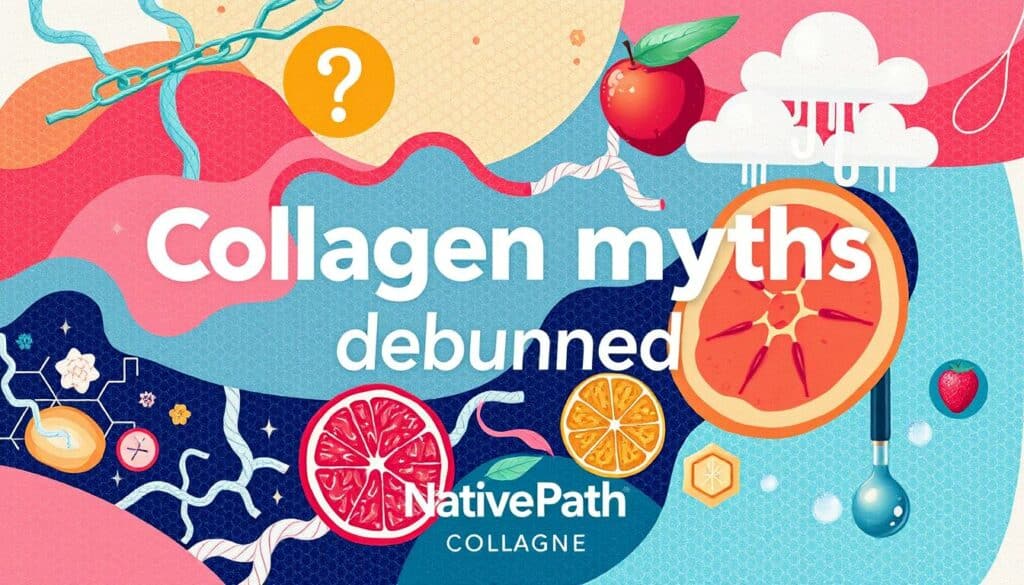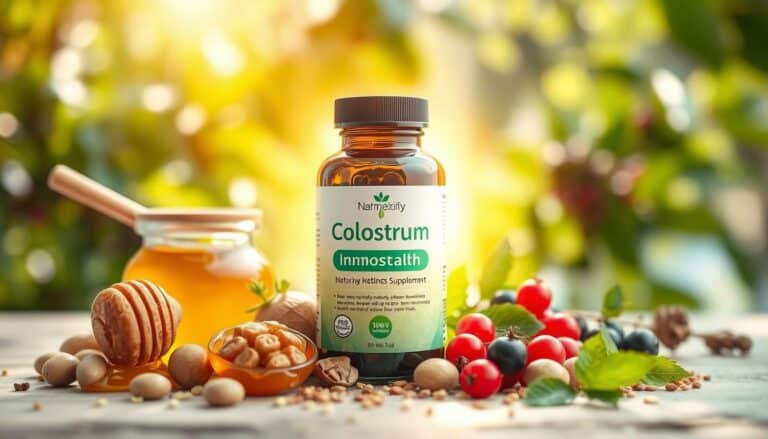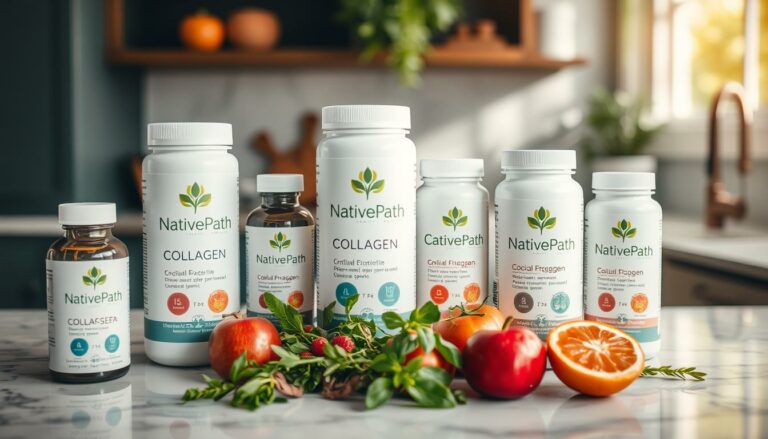Discover Amazing Collagen Benefits for Skin & Health
Ever looked in the mirror and wished for a magic potion? Nature has given us something close to that: collagen. It’s a protein that helps keep our skin young, our joints strong, and our bodies full of life.
As we get older, our bodies make less collagen. By our 30s, we lose 1-2% of it every year. But there’s hope! Learning about collagen’s benefits can help us fight aging and keep our health and beauty.
Collagen does many things, like making wrinkles smaller and easing joint pain. It’s not just for looks; it’s for feeling good too. It helps our bones, hair, nails, and muscles. It’s like a superhero for our bodies.
Want to learn more about collagen and how it can change your health and looks? Let’s see how this protein can improve your skin and overall health. It’s time to discover nature’s secret to staying young and healthy.
Key Takeaways
- Collagen production decreases with age, starting in our 30s
- Collagen benefits include improved skin elasticity and reduced wrinkles
- It supports joint health, bone strength, and muscle recovery
- Collagen supplements can help compensate for natural collagen loss
- Effects of collagen supplementation can be seen in as little as 8 weeks
- Different types of collagen target various aspects of health and beauty
What is Collagen and Why is It Important?
Collagen is a superstar protein in our bodies. It’s everywhere, in our skin, bones, and connective tissue. It’s like glue that keeps us together.
As we get older, our bodies make less collagen. After 30, we lose about 1-2% of it each year. This loss can cause wrinkles, joint pain, and weaker bones.
Understanding Collagen Types
There are many types of collagen, but five are most important in our bodies. Each type has a special job to keep us healthy:
| Collagen Type | Primary Location | Function |
|---|---|---|
| Type I | Skin, bones, tendons | Provides structure and strength |
| Type II | Cartilage | Cushions joints |
| Type III | Skin, blood vessels | Supports skin elasticity |
| Type IV | Kidneys, inner ear | Forms basal lamina |
| Type V | Hair, cell surfaces | Helps form cell membranes |
The Role of Collagen in the Body
Collagen’s structure is special. It forms a triple helix, making it strong and flexible. This structure helps our bodies in many ways.
It keeps our skin firm, joints smooth, and bones strong. Without enough collagen, we might look and feel older than we are.
“Collagen is like the scaffolding of youth, supporting our bodies from the inside out.”
Knowing how important collagen is can help us take care of our health. We can eat right or use supplements to keep our collagen levels up. This helps us stay young and full of life.
The Impact of Collagen on Skin Health
Collagen is very important for young, healthy skin. It’s the most common protein in our bodies. But, collagen production goes down in our 20s, by about 1% each year.
Collagen and Skin Elasticity
Skin elasticity is tied to collagen levels. Type I collagen is key for skin firmness. Type III collagen helps with elasticity and repair in young skin.
As we get older, less collagen means less elastic skin. This can cause sagging and wrinkles.
Reducing Wrinkles and Fine Lines
Collagen supplements can really help with wrinkles. Studies show they can make skin more hydrated and reduce fine lines. This works best for women aged 35 to 55.
Things like sun, bad diet, smoking, and stress can hurt collagen. Eating collagen-rich foods or taking supplements can help your skin. This keeps your skin looking younger.
“Collagen is like the scaffolding of our skin. As it diminishes, our skin loses its structure and firmness.”
While collagen supplements are helpful, they’re not everything. A good diet, skincare, and a healthy lifestyle are also important. They help keep your skin healthy and hydrated.
How Collagen Supports Joint Health
Collagen is very important for our joints and connective tissues. It’s the most common protein in our bodies. It helps keep our cartilage healthy. Let’s see how collagen helps our joints and eases pain.
The Connection Between Collagen and Cartilage
Cartilage is the soft tissue that makes our joints move smoothly. It needs collagen to work right. Type II collagen is key for cartilage health. It makes joints strong and flexible.
As we get older, we make less collagen. This can cause joint problems and osteoarthritis.
Alleviating Joint Pain with Collagen Supplements
Studies show collagen supplements can ease joint pain. They help people with osteoarthritis and athletes with joint pain. These supplements help grow new cartilage and reduce swelling.
| Benefit | Description |
|---|---|
| Joint Flexibility | Promotes healthy joint movement |
| Cartilage Support | Aids in maintaining cartilage structure |
| Pain Reduction | Helps alleviate joint discomfort |
| Collagen Production | Supports natural collagen synthesis |
To see collagen’s benefits, you need to keep taking it. It might take three to six months to feel better. Always talk to a doctor before trying new supplements, if you have joint problems or osteoarthritis.
Collagen’s Role in Muscle Mass Maintenance

Collagen is key for keeping muscle mass and helping athletes perform better. It’s the most common protein in our bodies. It has lots of glycine, proline, and hydroxyproline, which help fix tissues and make them stretchy.
Benefits for Athletes and Fitness Enthuasiasts
Collagen is special because of its amino acids. It helps keep muscles strong and might make your body look better. But, it’s not as good as whey or plant proteins for building muscle.
Promoting Muscle Recovery
Collagen peptides are easy to digest and absorb. They might help your muscles feel better after working out. Some studies say they can lessen muscle soreness, but we need more research.
| Protein Type | Primary Benefits | Best Use |
|---|---|---|
| Collagen | Tissue repair, joint support | Recovery, skin health |
| Whey | Muscle growth, quick absorption | Post-workout recovery |
| Casein | Slow-release protein | Prolonged muscle recovery |
| Plant-based | Diverse amino acid profiles | Vegan-friendly muscle support |
Collagen is great for fixing tissues and helping muscles recover. But, you should also eat other proteins to keep muscles strong and perform well. Always talk to a doctor before taking collagen.
Collagen for Bone Support
Collagen is key for strong, healthy bones. As we get older, our bodies make less collagen. This can hurt our bone density and raise the risk of osteoporosis.
Strengthening Bone Structure
Collagen is the backbone of our bones, giving them flexibility and strength. It works with calcium and other minerals to make bones strong. Research shows collagen supplements can boost bone density, helping postmenopausal women who lose bone faster.
- 5.79% increase in spine bone density
- 4.21% increase in hip area bone density
The Link Between Collagen and Osteoporosis
Osteoporosis is a big problem, causing bones to weaken. Collagen might help by:
- Helping bones absorb calcium better
- Boosting bone-building cells (osteoblasts)
- Slowing bone breakdown
Studies say taking collagen with calcium can greatly improve bone health. This is true for people with low bone density or osteopenia, a sign of osteoporosis.
| Collagen Type | Bone Health Benefits |
|---|---|
| Type I | Main component of bone structure |
| Type II | Supports cartilage in joints |
| Type III | Aids in bone remodeling |
While results differ, taking collagen for a year can improve bone strength. Remember, collagen is not a cure-all. It’s best when part of a healthy lifestyle with exercise and a diet full of calcium and vitamin D.
The Digestive Benefits of Collagen
Collagen is key for a healthy digestive system. It helps with skin, joints, and gut health. It also helps our body absorb nutrients better.
Balancing Gut Health with Collagen
Collagen has amino acids like glycine and proline. These help our intestines stay healthy. They make our gut lining stronger, helping us digest food better.
Eating foods rich in collagen, like bone broth, helps our intestines. This can make digestion better and help with stomach problems. Eating these foods regularly keeps our gut healthy.
Collagen’s Role in Nutrient Absorption
Collagen makes our gut lining strong. This helps our body take in nutrients from food. A healthy gut wall lets vitamins and minerals get into our blood.
| Collagen Type | Digestive Benefit | Food Sources |
|---|---|---|
| Hydrolysed Collagen | Improved absorption, gut lining support | Supplements |
| Whole Food Collagen | Gut health promotion, digestive support | Bone broth, gelatine |
Eating collagen, from supplements or foods, helps our digestion. It boosts gut health and nutrient absorption. Always talk to a doctor before making big changes to your diet.
Collagen Benefits for Hair and Nails
Collagen is key for hair and nail health. It’s full of amino acids for keratin. Keratin makes up hair and nails.
Promoting Hair Growth and Strength
Collagen makes hair grow stronger. It keeps the scalp healthy. It also protects hair from damage.
Enhancing Nail Durability
Collagen makes nails stronger. It helps build keratin. This makes nails healthier.
| Collagen Benefits | Hair | Nails |
|---|---|---|
| Strengthens Structure | Yes | Yes |
| Promotes Growth | Yes | Yes |
| Improves Appearance | Reduces Graying | Reduces Brittleness |
| Supports Hydration | Yes | Yes |
To get the most from collagen, eat well and drink water. Use collagen products like shampoos and nail treatments. Many see better hair and nails in a few months.
Sources of Collagen: What to Include in Your Diet

Our bodies start making less collagen from age 25. We can fight this by eating foods rich in collagen and taking supplements. Let’s see how to get more collagen from food and supplements.
Natural Food Sources of Collagen
Many foods help make more collagen or give it the parts it needs:
- Bone broth: Rich in amino acids that support collagen formation
- Oily fish: Salmon, mackerel, and tuna are high in marine collagen
- Chicken: Skin and connective tissues contain type II collagen for joint support
- Citrus fruits: Packed with vitamin C, essential for collagen synthesis
- Leafy greens: Spinach and kale provide plant-based collagen and protective antioxidants
- Nuts and seeds: Almonds and sunflower seeds support collagen production with zinc and copper
Supplementing with Collagen
Collagen supplements are easy to add to your diet. They come in different types:
| Supplement Type | Description | Best For |
|---|---|---|
| Hydrolyzed Collagen Powder | Easily dissolves in liquids, high absorption | Overall health, skin elasticity |
| Collagen Peptides | Short chains of amino acids, readily absorbed | Joint health, muscle recovery |
| Marine Collagen | Derived from fish, type I collagen | Skin hydration, anti-aging |
| Bovine Collagen | From cow sources, types I and III | Gut health, hair and nail strength |
When picking collagen supplements, choose ones tested by third parties. Talk to a doctor to find the right one for you. A mix of eating collagen-rich foods and taking supplements can keep your collagen levels up and support your health.
Collagen and Weight Management
Collagen is getting more attention for weight management. It’s a protein that might help your metabolism and aid in losing weight. Let’s see how collagen can help you on your fitness path.
Supporting Healthy Metabolism
Collagen is important for keeping muscle mass. This is key for a healthy metabolism. As we get older, our bodies make less collagen, which can slow down our metabolism.
By taking collagen, you can keep more lean muscle. This keeps your metabolism working well.
Collagen’s Role in Satiety
One big challenge in losing weight is feeling full. Collagen’s high protein can make you feel full longer. This can help you eat less during the day.
This feeling of fullness can lead to eating fewer calories. This supports your weight loss goals.
A study with 163 people showed 98% liked collagen supplements. They said it helped with weight management. More research is needed, but early signs are promising.
| Collagen Benefits | Impact on Weight Management |
|---|---|
| Supports muscle mass | Boosts metabolism |
| High protein content | Increases satiety |
| Aids in nutrient absorption | Improves overall nutrition |
Remember, collagen isn’t a magic fix for losing weight. It works best with a healthy diet and exercise. Always talk to a doctor before trying new supplements.
Debunking Myths about Collagen

Collagen has become very popular. But, there are many myths about it. Let’s look at the facts and what science says about collagen supplements.
Common Misconceptions
Some think collagen supplements can make you young again. But, collagen helps your skin stay elastic and hydrated. It doesn’t make you young instantly.
Collagen levels drop by 1% every year from our mid-20s. Supplements can help, but it takes time to see results.
- Myth: Collagen supplements work overnight
- Fact: Noticeable results typically appear after 8-12 weeks of consistent use
- Myth: All collagen supplements are the same
- Fact: Different types of collagen target specific areas of health
The Truth Behind Collagen Supplements
Science shows collagen does more than just help your skin. A 2019 study found it improves skin elasticity and hydration. It also reduces wrinkles.
Collagen is good for your joints, hair, and gut health too.
| Collagen Type | Primary Benefits | Best Source |
|---|---|---|
| Type I | Skin, hair, nails, bones | Marine collagen |
| Type II | Joint health | Chicken collagen |
| Type III | Gut health, muscles | Bovine collagen |
When picking a collagen supplement, choose clean ones without bad stuff. Look for third-party tests and NSF certifications. This means the product is safe and good.
Also, eating foods rich in Vitamin C can help collagen work better for your skin.
“Understanding the supplement facts and relying on scientific evidence is key when thinking about collagen. It’s not a magic fix, but it’s good for a healthy lifestyle when used right.”
How to Choose the Right Collagen Supplement
Finding the right collagen supplement can be hard. There are many choices, so it’s key to look at quality and where the ingredients come from. Let’s explore the different types of collagen supplements and how to read labels.
Types of Collagen Supplements
There are many kinds of collagen supplements, each with its own benefits. Bovine and marine collagen are the two main types. Bovine collagen comes from cows and is good for your gut and muscles.
Marine collagen is from fish and is easy for your body to use. It’s great for your skin.
| Collagen Type | Source | Benefits |
|---|---|---|
| Bovine | Cow hides | Joint pain relief, gut health, muscle strength |
| Marine | Fish skin and scales | Wrinkle reduction, skin hydration, UV protection |
Understanding Labels and Sourcing
When you look at labels, check for third-party testing stamps. These show the product is pure and strong. Choose supplements that say where their collagen comes from and what else is in them.
Hydrolyzed collagen or collagen peptides are better for your body to absorb.
Think about what you want from a supplement. For skin, 2.5 to 5 grams a day might be enough. For joints, you might need up to 10 grams. Always talk to a doctor before trying a new supplement.
The best collagen supplement for you depends on your needs and health goals. Focus on quality, where the ingredients come from, and third-party testing. This way, you’ll make a smart choice.
Conclusion: Embracing Collagen for Overall Wellness
Collagen is very important for our health. It helps our skin stay elastic and our joints strong. As we get older, our body makes less collagen.
Integrating Collagen into Your Daily Routine
It’s easy to add collagen to your daily routine. Just mix collagen powder into your coffee or smoothie. Doing this every day can make your skin and joints feel better.
The Future of Collagen in Health and Beauty
Research on collagen is growing. It shows that taking collagen can make your skin look younger and your joints feel better. New treatments like RF microneedling might even make your skin look better.
Collagen isn’t a magic cure for aging, but it’s really helpful. Always talk to a doctor before starting any new supplement. Adding collagen to your health plan can help your body stay healthy and look good.







